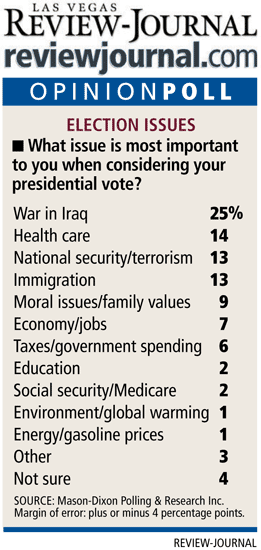By far, war in Iraq tops list of issues concerning voters
It has cost nearly 4,000 American lives, about $2 million a week to wage and is the media's lead story more often than not.
The war in Iraq is hard to ignore.
That the Middle East conflict weighs heavily on the minds of Nevadans was affirmed yet again by a new Review-Journal poll which found the war is the key interest of voters as they evaluate their presidential candidates.
The 4-year-old military engagement is the most important issue by a nearly 2-1 margin over each of the next three top matters of concern: health care, national security/terrorism and immigration.
Brad Coker, managing partner of Washington, D.C.-based Mason-Dixon Polling & Research, Inc., isn't surprised that 25 percent of Nevada's voters named the war as their top issue.
"It's been the big issue in every poll over the last four years," Coker said. "There is much at stake."
Coker said the second tier of concerns generally change in priority among voters depending on the media attention each gets.
"If candidates are talking about health care, then that becomes the second most important," he said. "If a terrorist action takes place, then national security becomes particularly important to voters. When an immigration bill comes up, then that takes priority."
Eric Herzik, a political scientist at the University of Nevada, Reno, wasn't surprised that the war captured the attention of a large segment of the state's voters. But he was surprised that only 7 percent of respondents named the economy as a top concern.
"It is usually one of the top concerns," he said, noting that the state of the economy was pivotal in the 1992 election.
"What this poll means to me is that for all the complaints about the housing industry and job creation, the economy is in pretty good shape," he said.
"Unemployment and inflation are under control. There's always the threat of a looming recession, but people aren't afraid it's about to descend," he added.
David Damore, a political scientist at the University of Nevada, Las Vegas, noted that although foreclosures have resulted in media focus on the economy, "they still directly affect a small percentage of the American people. Polls will change the more people get affected."
The poll, in which 625 registered Nevada voters were interviewed Tuesday through Thursday, has a margin of error of plus or minus 4 percentage points.
Though many presidential candidates talk about education, the Review-Journal poll found only 2 percent of respondents view it as a top concern in voting for a president.
"That is not surprising to me at all," Herzik said. "People see it as a local issue. Now, if we were talking about a race for governor rather than president, it would be much different."
Taxes and government spending, a huge topic of many presidential candidates, particularly fiscally conservative Republicans, was named a top issue by only 6 percent of the state's voters. Only 8 percent of Republicans surveyed saw it that way.
"That is somewhat surprising because Republican candidates talk about that so much," Damore said.
"You would think more Republicans would want to capture their brand."
Although 36 percent of Democrats say the war in Iraq was most important to them in the selection of a president, only 14 percent of Republicans list it as their top issue. Independents are in between, at 23 percent.
"Republicans are trying to wash their hands of the war," Damore said.
But Herzik said Republicans view the war in Iraq as part of the overall war on terror and view the Middle East conflict through a different lens. Twenty-three percent of Republicans name the war on terror as their top issue, compared to only 4 percent of Democrats.
"Democrats and Republicans are talking past each other on this," he said. "It's no wonder we're so polarized."
On the question of health care, 20 percent of Democrats saw it as the top issue, compared to only 6 percent of Republicans and 14 percent of independents.
Herzik explained that by suggesting the Republicans don't want government forcing a single-payer system on people.
Damore said the reason is simple why Republicans don't see health care as critical: "They have got more money, so they don't have to worry about it."
The issue of immigration also shows a great disparity between Republicans and Democrats, with 21 percent of Republicans calling it a key issue compared to only 7 percent of Democrats.
"Republicans are more nationalistic," Damore said. "Democrats are trying to pick up votes."
Coker warned that Republicans and Democrats will have to broaden their bases if they want to win in 2008.
"They're doing a good job of preaching to the choir," he said. "But independents are 17 percent of the electorate. They are the deciding votes. Neither side can win with just their base. They're going to have to reach out to the independents."
Contact reporter Paul Harasim at pharasim@reviewjournal.com or (702) 387-2908.
ON THE WEB
Complete poll information

















